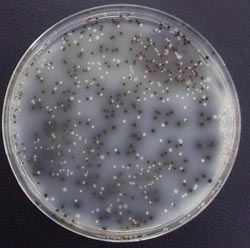Bacterial policing: Why you’d better cooperate with your own family

Petri dish with bacteria: a special technique reveals social cheats (white colonies), cooperating bacteria form black colonies.<br><br>Foto: Universität Göttingen<br>
Bacteria are unicellular organisms that may show surprising levels of sociality. They can coordinate their behavior and cooperatively build enzymes or defence compounds that a single cell would not be able to produce in sufficient quantity.
Such cooperative traits are extremely useful but at the same time vulnerable to social cheaters. Scientists from the University of Göttingen recently discovered that cooperating bacteria are able to produce toxins to defend themselves against social cheaters. However, this mechanism only functions among bacteria with close kin progeny. It turns unreliable when it comes to fighting social cheats from little related lineages. The study was published in Nature Communications.
The researchers analysed bacteria of the genus Pseudomonas, a widespread group that includes useful kinds as well as pathogenic germs. They grew multispecies communities in which social cheats rapidly evolved. The cheats were kept under control with the help of a clever mechanism: The cooperators produced toxins that left the cooperating bacteria unaffected and killed those who stopped doing so. However, the mechanism only works among closely related kin. It fails to control cheats from little related lineages.
“Bacteria exercise tight control over their clones,” leading author Dr. Alexandre Jousset from Göttingen Uni-versity’s Animal Ecology section explains. “Therefore, cooperation is only stable if all organisms within the community are closely related.” This finding about ‘bacterial partisanship’ might prove very useful with regard to curing diseases. The dangerousness of germs is often based on functioning cooperation among bacteria. “Injecting social cheats from little related lineages into communities might be a way to purposefully disturb cooperation and thus reduce the dangerousness of the disease,” says Jousset.
Original publication: Alexandre Jousset et al. Evolutionary history predicts the stability of cooperation in mi-crobial communities. Nature Communications 4:2573. Doi: 10.1038/ncomms3573.
Contact:
Dr. Alexandre Jousset
Georg-August University Göttingen
Faculty of Biology and Psychology
Johann-Friedrich-Blumenbach-Institute für Anthropology and Zoology
Animal Ecology
Berliner Straße 28, 37073 Göttingen, Germany, Phone +49 (0)551 39-5448
Email: ajousse@gwdg.de
Media Contact
More Information:
http://www.uni-goettingen.de/en/115381.htmlAll latest news from the category: Life Sciences and Chemistry
Articles and reports from the Life Sciences and chemistry area deal with applied and basic research into modern biology, chemistry and human medicine.
Valuable information can be found on a range of life sciences fields including bacteriology, biochemistry, bionics, bioinformatics, biophysics, biotechnology, genetics, geobotany, human biology, marine biology, microbiology, molecular biology, cellular biology, zoology, bioinorganic chemistry, microchemistry and environmental chemistry.
Newest articles

“Nanostitches” enable lighter and tougher composite materials
In research that may lead to next-generation airplanes and spacecraft, MIT engineers used carbon nanotubes to prevent cracking in multilayered composites. To save on fuel and reduce aircraft emissions, engineers…

Trash to treasure
Researchers turn metal waste into catalyst for hydrogen. Scientists have found a way to transform metal waste into a highly efficient catalyst to make hydrogen from water, a discovery that…

Real-time detection of infectious disease viruses
… by searching for molecular fingerprinting. A research team consisting of Professor Kyoung-Duck Park and Taeyoung Moon and Huitae Joo, PhD candidates, from the Department of Physics at Pohang University…





















